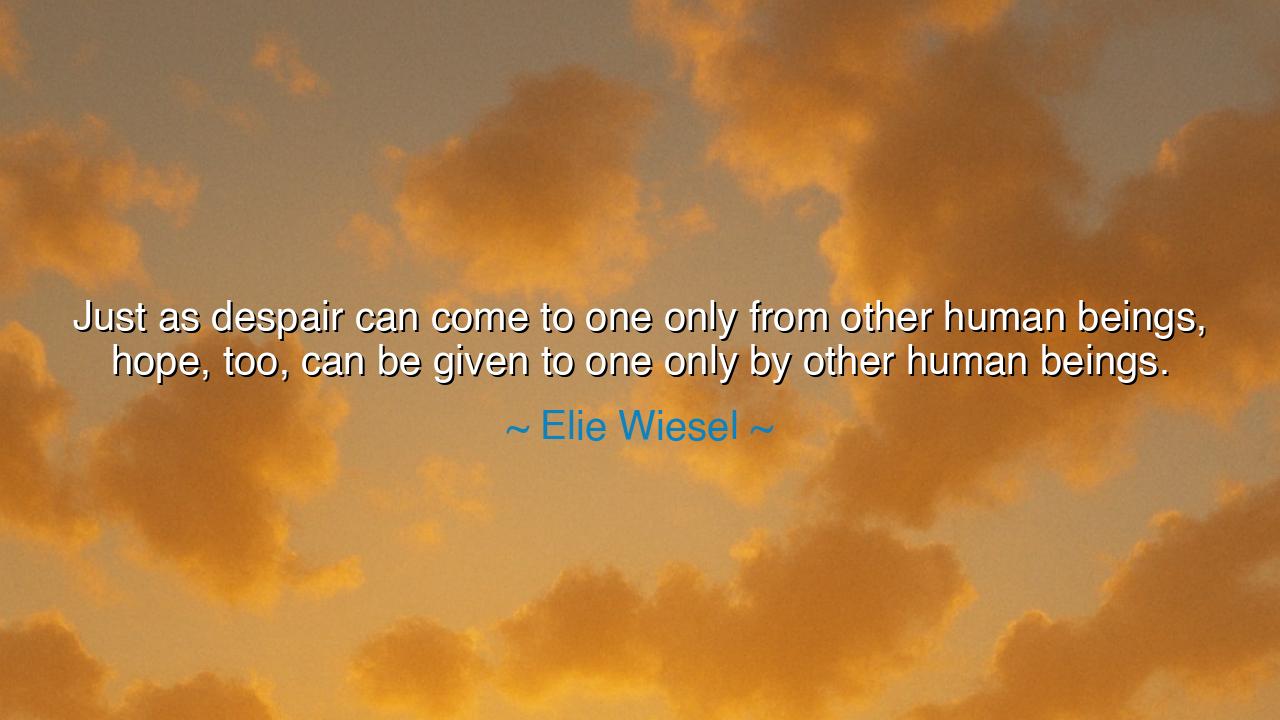
Just as despair can come to one only from other human beings
Just as despair can come to one only from other human beings, hope, too, can be given to one only by other human beings.






The words of Elie Wiesel—“Just as despair can come to one only from other human beings, hope, too, can be given to one only by other human beings”—flow like fire and mercy intertwined. They are not the musings of a philosopher in comfort, but the testimony of one who walked through the deepest valley of human cruelty and yet still spoke of light. Wiesel, a survivor of the Holocaust, carried within him the memory of humanity at its worst, and still he proclaimed this truth: that within the same heart that wounds lies the power to heal. In these words, he gives voice to the ancient paradox of mankind—that we are both the source of each other’s despair and the bearers of each other’s hope.
To understand his meaning, we must first look upon the first half of his truth: “Despair can come to one only from other human beings.” For indeed, nature does not betray us. The storm destroys, but not out of malice. The ocean drowns, but not in hatred. Only man has the capacity to choose cruelty, to inflict suffering not by necessity but by will. It is the betrayal, the violence, the indifference of our fellow humans that cuts deepest into the soul. Wiesel knew this more than most; he saw children starved, families torn apart, faith mocked by the machinery of evil. From such acts was born a despair so profound that it could only be called human. The ancients would have called it the fall of compassion, the darkening of the divine spark within man.
Yet Wiesel does not leave us there, in the shadows. He completes the circle of his wisdom: “Hope, too, can be given to one only by other human beings.” This is the redemption of his message. For just as mankind has the power to destroy, so too does it have the sacred power to restore. A single act of kindness, a word spoken in courage, a hand extended in solidarity—these can rebuild what cruelty has shattered. Wiesel saw that the same species that had built the camps also built the rescue shelters; that the same humanity that produced tyrants also produced those who risked their lives to save strangers. Thus, hope is not born of miracles from heaven—it is born from the hearts of one another.
History itself bears witness to this eternal balance. Consider the story of Oskar Schindler, who in the midst of the same darkness that Wiesel endured, chose to stand against the tide of evil. A businessman among monsters, Schindler used his wealth and cunning to save more than a thousand Jewish lives from the flames of death. His courage did not erase the despair of his time, but it pierced it. Each life he saved became a spark of hope in a world that had nearly drowned in despair. Wiesel’s words speak of this truth: when one human being remembers compassion, the chain of despair is broken.
In these words also lies a profound teaching about human interdependence. We are not solitary creatures of reason, as some philosophers have claimed; we are vessels of emotion, shaped by every touch of kindness or cruelty we receive. The heart cannot survive in isolation—it either withers in neglect or flourishes in communion. To live well, then, is to recognize that our choices are never our own alone. The tone of a word, the warmth of a gaze, the courage of a gesture—all ripple outward, changing unseen lives. We are both the poison and the cure in the lives of others.
Wiesel’s insight also calls us to responsibility. If despair and hope alike are born from human hands, then we cannot wait for salvation to descend from the heavens. The duty to heal belongs to us. Each day we are given the chance to choose what we will create in others—a wound or a light. The smallest act of empathy can mean more than we imagine. A smile to the lonely, a listening ear to the forgotten, a word of truth spoken where lies reign—these are the deeds that kindle hope in a world perpetually on the brink of despair.
Let this, then, be the teaching carried forward: be the giver of hope. Do not underestimate the power of your humanity. The world may wound, but it can also mend, and that mending begins in you. When cruelty tempts you, remember the despair it breeds. When compassion moves you, remember the hope it plants. To live as Elie Wiesel teaches is to understand that we are all both messengers and guardians—that every act, however small, tips the balance between light and shadow.
For in the end, the truth is both humbling and divine: despair is human—but so is hope. And as long as even one human being chooses kindness over indifference, the light shall not vanish. Wiesel’s words endure as a covenant for all time, reminding us that while the darkness is real, it is not eternal—for we are the keepers of each other’s dawn.






AAdministratorAdministrator
Welcome, honored guests. Please leave a comment, we will respond soon